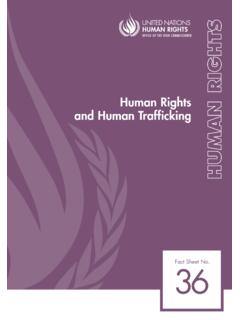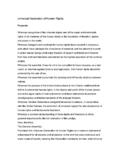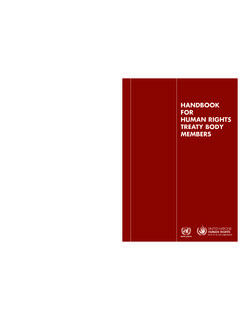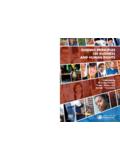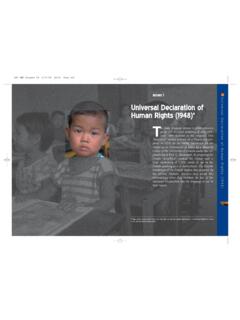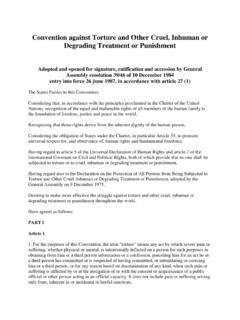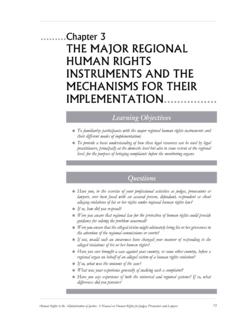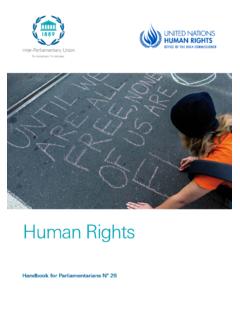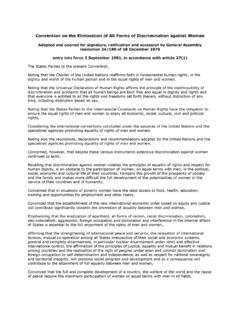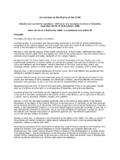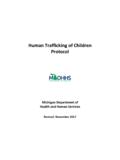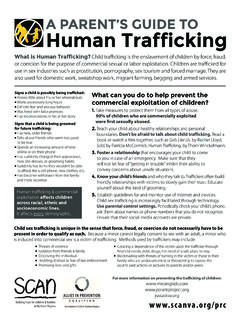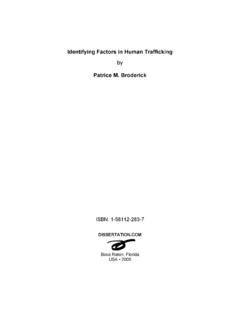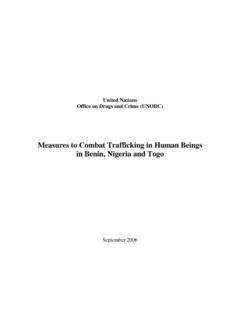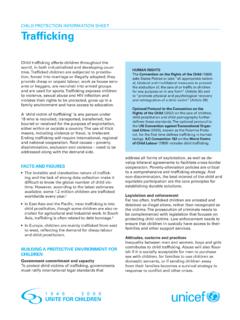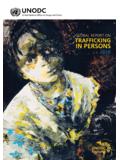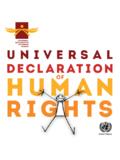Transcription of Recommended Principles and Guidelines on …
1 OFFICE OF THE HIGH COMMISSIONER FOR. human RIGHTS. Recommended Principles and Guidelines on human Rights and human trafficking *. Contents Paragraphs Page Recommended Principles on human Rights and human trafficking .. 1 17 1. The primacy of human rights .. 1 3 1. Preventing trafficking .. 4 6 1. Protection and assistance .. 7 11 1. Criminalization, punishment and redress .. 12 17 2. Recommended Guidelines on human Rights and human trafficking .. 3. Guideline 1: Promotion and protection of human rights .. 3. Guideline 2: Identification of trafficked persons and traffickers .. 4. Guideline 3: Research, analysis, evaluation and dissemination .. 5. Guideline 4: Ensuring an adequate legal framework .. 6. Guideline 5: Ensuring an adequate law enforcement response.
2 7. Guideline 6: Protection and support for trafficked persons .. 9. Guideline 7: Preventing trafficking .. 10. Guideline 8: Special measures for the protection and support of child victims of trafficking . 11. Guideline 9: Access to remedies .. 12. Guideline 10: Obligations of peacekeepers, civilian police and humanitarian and diplomatic personnel .. 13. Guideline 11: Cooperation and coordination between States and regions .. 14. * Text presented to the Economic and Social Council as an addendum to the report of the United Nations High Commissioner for human Rights (E/2002/68/Add. 1). trafficking in human persons is a particularly abusive form of migration. In the Millennium Declaration, States resolved to take measures to ensure respect for the protection of the rights of migrants and to intensify their efforts to fight trafficking .
3 The Recommended Principles and Guidelines on human Rights and human trafficking , which are included as an addendum to my report to the Economic and Social Council (E/2002/68 ), have been developed in order to provide practical, rights-based policy guidance on the prevention of trafficking and the protection of victims of trafficking . Their purpose is to promote and facilitate the integration of a human rights perspective into national, regional and international anti- trafficking laws, policies and interventions. The Principles and Guidelines serve as a framework and reference point for the work of OHCHR on this issue. I encourage States and intergovernmental organizations to make use of the Principles and Guidelines in their own efforts to prevent trafficking and to protect the rights of trafficked persons.
4 Mary Robinson High Commissioner for human Rights Recommended Principles on human Rights and human Trafficking1. The primacy of human rights 1. The human rights of trafficked persons shall be at the centre of all efforts to prevent and combat trafficking and to protect, assist and provide redress to victims. 2. States have a responsibility under international law to act with due diligence to prevent trafficking , to investigate and prosecute traffickers and to assist and protect trafficked persons. 3. Anti- trafficking measures shall not adversely affect the human rights and dignity of persons, in particular the rights of those who have been trafficked, and of migrants, internally displaced persons, refugees and asylum-seekers. Preventing trafficking 4.
5 Strategies aimed at preventing trafficking shall address demand as a root cause of trafficking . 5. States and intergovernmental organizations shall ensure that their interventions address the factors that increase vulnerability to trafficking , including inequality, poverty and all forms of discrimination. 6. States shall exercise due diligence in identifying and eradicating public- sector involvement or complicity in trafficking . All public officials suspected of being implicated in trafficking shall be investigated, tried and, if convicted, appropriately punished. Protection and assistance 7. Trafficked persons shall not be detained, charged or prosecuted for the illegality of their entry into or residence in countries of transit and destination, or for their involvement in unlawful activities to the extent that such involvement is a direct consequence of their situation as trafficked persons.
6 8. States shall ensure that trafficked persons are protected from further exploitation and harm and have access to adequate physical and psychological care. Such protection and care shall not be made conditional upon the capacity or willingness of the trafficked person to cooperate in legal proceedings. 1 The term trafficking , as used in the present Principles and Guidelines , refers to the recruitment, transportation, transfer, harbouring or receipt of persons, by means of the threat or use of force or other forms of coercion, of abduction, of fraud, of deception, of the abuse of power or of a position of vulnerability or of the giving or receiving of payments or benefits to achieve the consent of a person having control over another person, for the purpose of exploitation.
7 Exploitation shall include, at a minimum, the exploitation of the prostitution of others or other forms of sexual exploitation, forced labour or services, slavery or practices similar to slavery, servitude or the removal of organs. Source: Protocol to Prevent, Suppress and Punish trafficking in Persons, Especially Women and Children, supplementing the United Nations Convention against Transnational Organized Crime (article 3 (a)). 1. 9. Legal and other assistance shall be provided to trafficked persons for the duration of any criminal, civil or other actions against suspected traffickers. States shall provide protection and temporary residence permits to victims and witnesses during legal proceedings. 10. Children who are victims of trafficking shall be identified as such.
8 Their best interests shall be considered paramount at all times. Child victims of trafficking shall be provided with appropriate assistance and protection. Full account shall be taken of their special vulnerabilities, rights and needs. 11. Safe (and, to the extent possible, voluntary) return shall be guaranteed to trafficked persons by both the receiving State and the State of origin. Trafficked persons shall be offered legal alternatives to repatriation in cases where it is reasonable to conclude that such repatriation would pose a serious risk to their safety and/or to the safety of their families. Criminalization, punishment and redress 12. States shall adopt appropriate legislative and other measures necessary to establish, as criminal offences, trafficking , its component acts 2 and related 13.
9 States shall effectively investigate, prosecute and adjudicate trafficking , including its component acts and related conduct, whether committed by governmental or by non-State actors. 14. States shall ensure that trafficking , its component acts and related offences constitute extraditable offences under national law and extradition treaties. States shall cooperate to ensure that the appropriate extradition procedures are followed in accordance with international law. 15. Effective and proportionate sanctions shall be applied to individuals and legal persons found guilty of trafficking or of its component or related offences. 16. States shall, in appropriate cases, freeze and confiscate the assets of individuals and legal persons involved in trafficking .
10 To the extent possible, confiscated assets shall be used to support and compensate victims of trafficking . 17. States shall ensure that trafficked persons are given access to effective and appropriate legal remedies. 2 For the purposes of the present Principles and Guidelines , the component acts and component offences of trafficking are understood to include the recruitment, transportation, transfer, harbouring or receipt of persons over eighteen years of age by means of threat, force, coercion or deception for the purpose of exploitation. The recruitment, transportation, transfer, harbouring or receipt of a person under eighteen years of age constitute component acts and component offences of trafficking in children. Source: Protocol to Prevent, Suppress and Punish trafficking in Persons, Especially Women and Children, supplementing the United Nations Convention against Transnational Organized Crime, articles 3 (a) and 3 (c).
